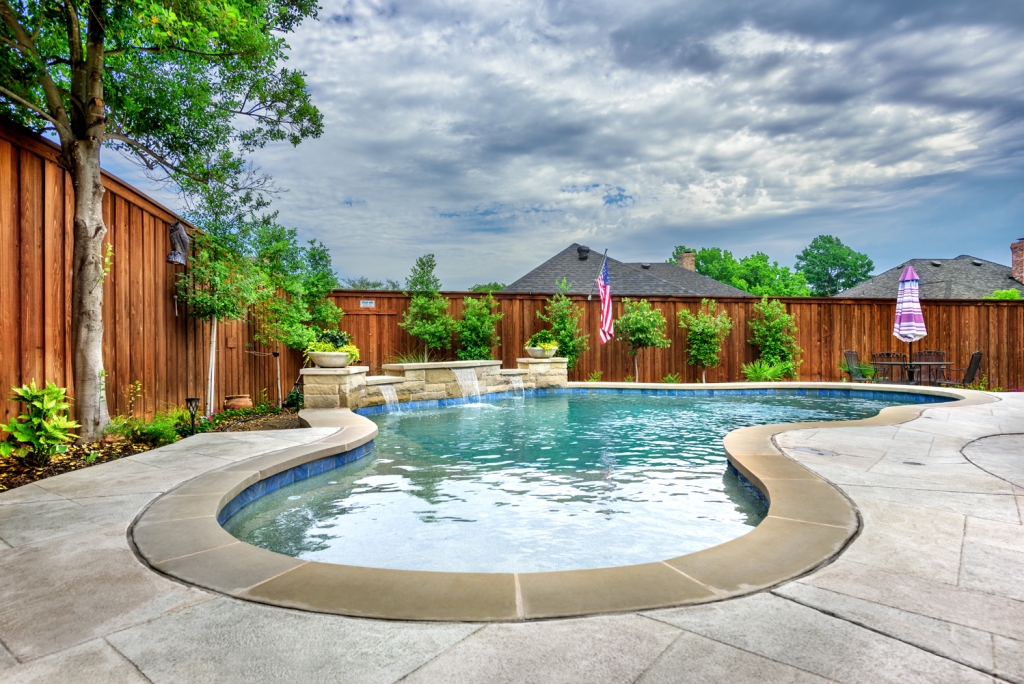Saltwater vs Chlorine Pools: Which Type Is Best For Texas?
Most people tend to associate swimming pools with chlorine to keep the water sparkling and clean. However, saltwater is another option available, but do they work for pools in Texas?
Getting through summer in Texas without any access to a swimming pool can be unbearable, but the good news is that no matter which cleaning system you’d like, here at Pulliam Pools we’re your award-winning pool builder. That means you can have a custom pool built to your specifications to help you enjoy time with family and friends in your backyard — whether that’s for Fourth of July celebrations or just getting the kids outside to play.
So, should you choose a chlorine pool or a saltwater pool? This month, we’re going to discuss the pros and cons of each system to help you decide.

The benefits of chlorine swimming pools
Chlorine pools are probably the most common type and the one you’ll be most familiar with in terms of the feel and smell of the water. With that in mind, let’s explore the benefits of chlorine pools:
- Chlorine is easy to purchase
Because of how popular chlorine pools are, it means there are plenty of places where you can buy the right chemicals to suit your needs. You’ll find it easier to find as things currently stand in the marketplace, and that means you can keep your pool fresh all year round.
- You don’t need electricity
Chlorine can be added directly to your pool and gets moved around by your water pumping system. Saltwater pools, on the other hand, require a chlorinator to separate the salt to create the necessary chlorine. That chlorinator uses electricity, something you don’t need to distribute normal chlorine chemicals. This is something to consider based on the energy costs of your home in Texas.
- It won’t damage fixtures
Unlike some cleaning methods for swimming pools, using chlorine won’t damage the pool and the fixtures or materials within. Other methods can have a corrosive effect on metals and stone materials, but if you keep your chlorine level balanced well you won’t face such issues.
So what about the disadvantages of chlorine pool water? There aren’t really any drawbacks, as long as you’re keeping a close eye on the chemical balance of the water to keep it comfortable to swim in. If you fail to keep on top of this and the level drops too low, you could find bacteria starting to grow.
The pitfalls of saltwater swimming pools
Saltwater swimming pools have become something of a trend, but it’s not ideal for homeowners in Texas for several reasons. Let’s take a look at the potential drawbacks of using saltwater to disinfect your pool:
- Can be corrosive
One of the biggest drawbacks of a saltwater pool in Texas is the corrosive impact it can have on both the metal and stone surrounding your pool. Not only can things such as pool ladders start to corrode, but your beautiful stone outside of the pool can be washed by saltwater, leaving a white residue behind that can tarnish the look and feel of the space. This will eventually start to erode the stone as it creates gaps and holes in the surface over time.
- No difference in maintenance
If you install a saltwater system for your pool, you aren’t really saving yourself much time on maintenance, as the system still needs to be checked and refilled. During intense summer heat here in TX, the water will evaporate in much the same way as in a chlorine pool, requiring you to use increased amounts of salt that – as we’ve pointed out – isn’t as easy to get.
- Greater upfront cost
A saltwater pool, since it requires a special chlorinator, means you’ll likely be paying more upfront for your cleaning system. It’s a special piece of equipment that uses a chemical reaction to extract chlorine from salt, so you’re paying more for chlorine, just in a different format.
What then are the benefits of a saltwater pool?
Well, there aren’t any when compared with a chlorine pool unless you absolutely cannot stand the smell, but for most people, it signals that the pool water is clean. The scent is potentially the only reason someone might choose a saltwater pool, but due to the additional cost and the potential damage it can do to a pool in Texas over time, it’s not something we recommend.
Ultimately, the choice you make for your pool cleaning system is completely up to you. We’re seeing more homeowners in Texas take the plunge into pool culture, since they’re a fantastic feature to have from March through to Fall when the temperature drops. As you can see, there are so many benefits to a traditional chlorine pool, creating a safe, refreshing swim where it’s easy to adjust the chemical balance as needed.
At Pulliam Pools, we’ve been leading the way for custom pools in Fort Worth, Weatherford, Arlington, and the surrounding areas in Texas since 1916. With award-winning pools designed and built by our team, you can rest assured that you’re getting the pool of your dreams regardless of which system you choose to keep your pool water safe. We can even offer professional pool maintenance to take the hassle out of cleaning and balancing your pool water, ensuring you and your family can make a splash whenever you feel like it!
